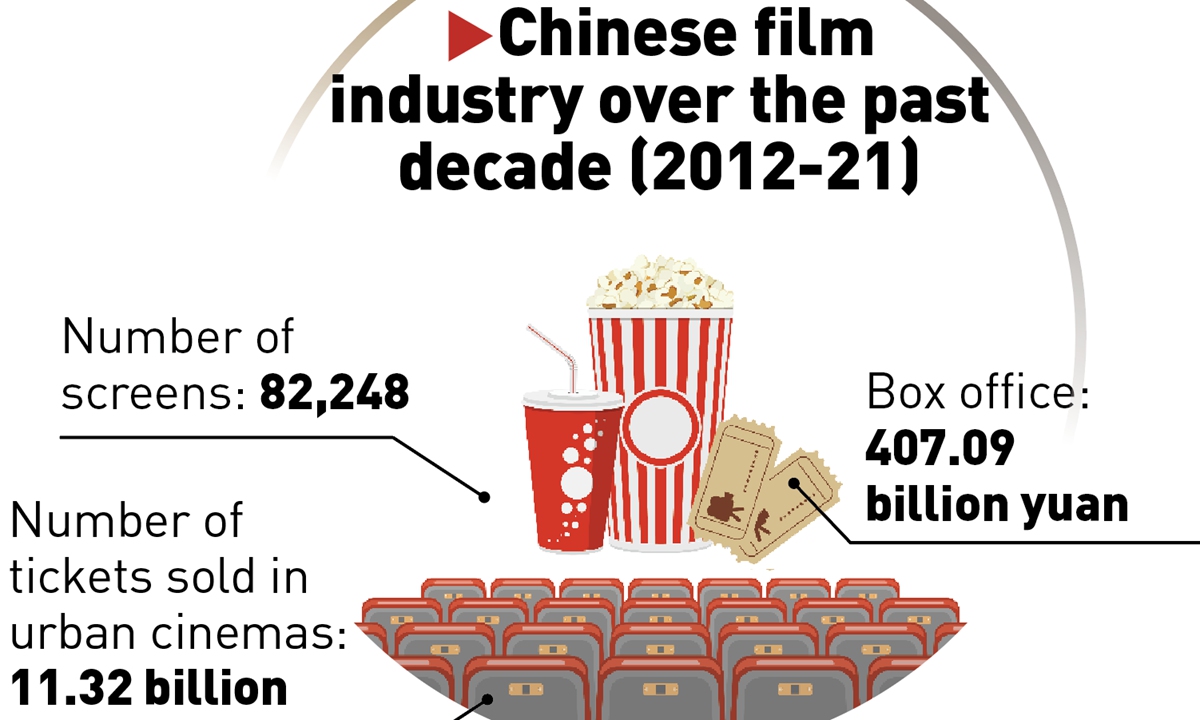
My People, My Country Photo:Courtesy of Maoyan
With the increase in the number of high-quality films produced by Chinese studios over the past decade, more Chinese audiences have been heading to the cinema, helping set new box-office records.
According to data published on October 13 by China Central Television, judging from the perspective of market size, Chinese films have performed quite well over the past 10 years. From 2012 to 2021, the cumulative box office in the Chinese mainland film market reached 407.09 billion yuan ($55 billion), and by the end of September 2022, this figure increased to 432.76 billion yuan.
Additionally, the Chinese mainland became the world's largest film market in 2020, a trend that continued for 2021.
From 2012 to 2021, about 11.32 billion tickets were sold in urban cinemas, while 2022 has added more than 610 million tickets to that figure. The number of film screens in the mainland has been growing as well, reaching a total of 82,248 in 2021.
Domestic films have become increasingly prominent in the market. In 2021, domestic films accounted for 84.49 percent of the mainland box office, a new high.
Among the different genres of domestic-made movies, the quality of patriotic films has sharply increased. Chinese filmmakers have been exploring ways to produce patriotic works that combine deep thinking and entertainment, such as the successful films
The Battle at Lake Changjin and Wolf Warrior 2.
"During this decade, Chinese commercial and art films have been experimenting and as a result the box office has grown exponentially. Commercial films are becoming more mature and literary, while art films are also gaining more attention and achievements in the international film industry. More Chinese filmmakers are also appearing on the international stage. The film industry's production and business models have been gradually improving," Luo Luo, a Beijing-based film critic, told the Global Times.

Source: China Central Television Graphic: Liu Xidan/GT
Works of excellence During the past National Day holidays, which are often seen as one of the three golden periods for releasing the most recent movies in China, the patriotic film Home Coming, based on the true story of bringing trapped Chinese nationals back to their homeland, topped the box office with more than 1.3 billion yuan and gained good reviews, earning a 7.4/10 on media review platform Douban from more than 220,000 reviews.
The film is one of the high-quality patriotic movies released over the past decade. Many other brilliant works with similar themes have also been performing stunningly.
The 2021 film
The Battle at Lake Changjin, set during the War to Resist US Aggression and Aid Korea (1950-53), depicts the Chinese People's Volunteer Army's bravery in a key campaign at Lake Changjin, or the Chosin Reservoir, amid freezing conditions. It set a new box-office record for patriotic movies, grossing more than 5.7 billion yuan.
Another record-breaking movie,
My People, My Country, an epic seven-part anthology marking the 70th anniversary of the founding of the People's Republic of China, was the first Chinese movie to be released simultaneously in more than 10 European countries.
Shi Chuan, vice chairman of the Shanghai Film Association, told the Global Times that these patriotic movies' success can be attributed to a willingness to incorporate the characteristics of commercial blockbuster films such as exciting action scenes and good narratives, which are more appealing to audiences.
Luo noted that over the past decade, Chinese filmmakers have really been carefully considering how to make excellent patriotic films, including using more interesting narrative techniques, inviting more popular performers and improving visual effects. These methods, coupled with people's increasing pride in the country, have ensured a larger audience for such movies.

Wolf Warrior 2 Photo:Courtesy of Maoyan
Expanded boundariesBesides patriotic movies, Chinese filmmakers have been actively expanding the boundaries of filmmaking. Over the past 10 years, they have produced a number of big-budget films in a variety of genres, winning both in terms of box office and reputation.
The 2019 sci-fi blockbuster
The Wandering Earth, an adaptation of Liu Cixin's story of humans struggling to move Earth to a new home, impressed many Chinese audiences who now long to see the sequel. The hit
Ne Zha, adapted from the traditional Chinese folk myth, became the highest-grossing animated film in China.
Film industry insiders are optimistic about the future development of Chinese films.
"When the COVID-19 pandemic subsides, the box office will pick up again and the number of new movies will increase. Chinese films will also have more international exchanges and cooperation, not only participation in foreign film festivals and exhibitions, but also exchanges of more talents and resources," Luo noted.

Chinese film The Battle at Lake Changjin Photo:Courtesy of Maoyan







